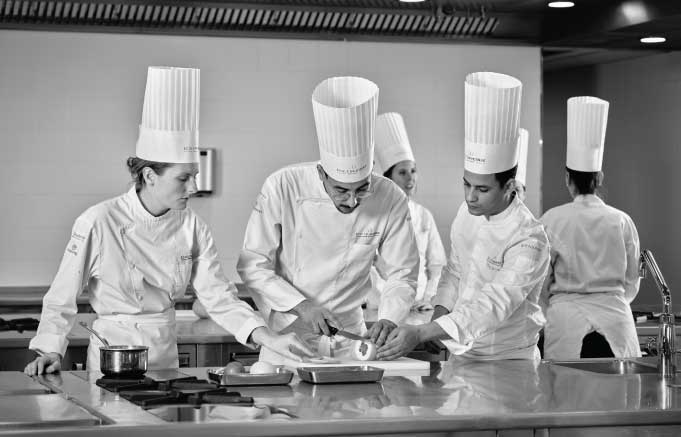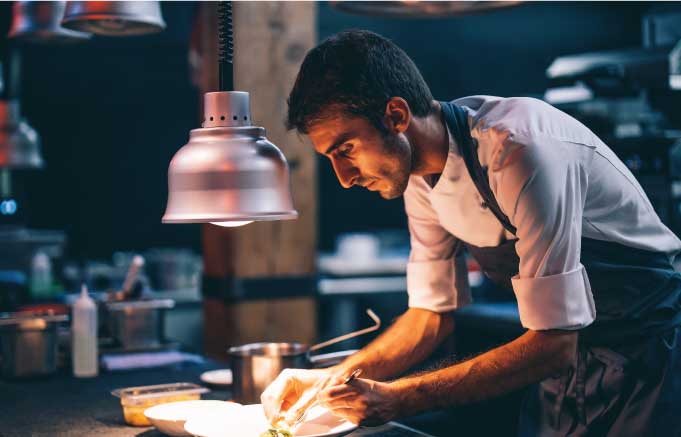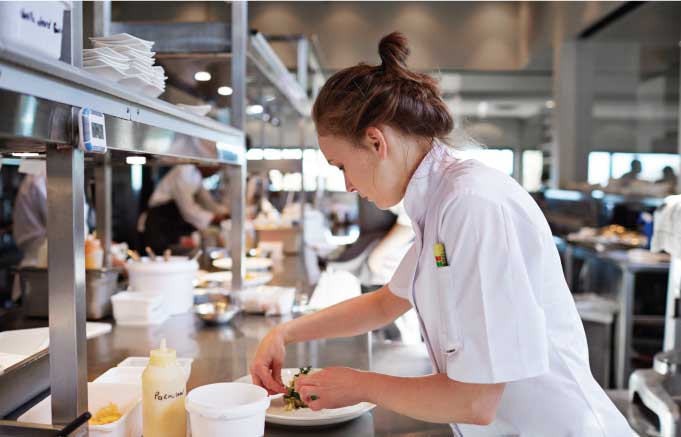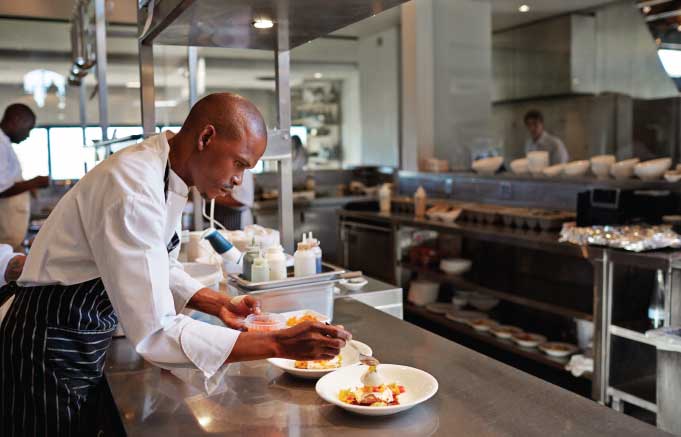What is the difference between a cook and a chef?

If you're looking at starting a career in the culinary world, you'll have probably come across a range of different job paths that you can take. It can be a challenge to tell what different culinary careers will be like, especially as there are so many job titles and career paths.
Two roles that are often confused are the roles of cook and chef. While a lot of people use these terms somewhat interchangeably, there are actually significant differences between the two. In this article, we'll go over what these two roles are, what duties and responsibilities you could expect in these roles, and how to set yourself on the path to a career as either a cook or a chef.
Introduction to the difference between a cook and a chef
While in common terminology "cook" and "chef" might be similar, there are actually many differences between these two roles in the world of the culinary arts. While both are involved in the culinary world and ensuring that guests get the best food possible, their duties can actually be very different and they have a different level of responsibility. Let's look in more detail at the two roles.

What is a cook?
Cooks work in professional kitchens, catering companies, and other professional settings just as chefs do, but there are some important differences to consider between the two.
Definition of a cook
A cook is defined as a person that cooks and prepares food in any kind of setting. This is a very hands-on role dealing directly with food. Many cooks work in professional kitchens such as cafeterias at schools or prisons, as well as diners and other establishments.
However, you'll also find a lot of cooks working in restaurants, hotel kitchens, and other places. In these kinds of settings, cooks will often work as part of a much larger hierarchy, including being overseen by chefs and kitchen management.
Responsibilities and duties
Different types of cooks will have different duties and responsibilities within a professional kitchen, though there are some main tasks that are standard for a cook's duties. These include:
- Following recipes to make meals or parts of meals
- Following a meal plan set out by chefs or kitchen management
- Cleaning the kitchen
- Maintaining a certain station or part of the kitchen
- Preparing ingredients, including scaling fish or peeling vegetables
- Any other tasks as required by the kitchen management
Education and training requirements for a cook
Quite often, cooks will be at an early stage in their culinary arts journey. A lot of places will not have many formal requirements for cooks, including education requirements, though some may expect a cook to have completed a basic cooking course. A cook will be expected to know a range of cooking techniques, including roasting, boiling, sauteing, sauce preparation, and dessert making.
Specific station cooks would be expected to have experience in their part of the kitchen, which can often be gained through work experience, an apprenticeship, or mentorship.

What is a chef?
Chefs are usually more highly skilled and trained than cooks, which leads to many differences in the tasks they take on in professional kitchens.
Definition of a chef
A chef is a skilled professional who has studied the culinary arts and knows how to create and modify dishes. In smaller kitchens, chefs will usually be at the top of the hierarchy. In larger kitchens, there may be multiple levels of chefs with different jobs, as well as a head chef or executive chef who works as kitchen management. If you want to become a chef, you could work anywhere from a restaurant kitchen to working as a personal chef.
Responsibilities and duties
With their skills and knowledge, chefs undertake many responsibilities and duties. The exact tasks will depend on the level of the chef and the type of kitchen they are working in. As well as preparing food and complex dishes, chefs will often have a range of other duties, including:
- Overseeing the kitchen operations
- Creatively developing menu items
- Mentoring and training kitchen staff
Education and training requirements for a chef
Most of the time, chefs are culinary professionals who gain education through a culinary degree or high-level culinary classes. This type of training goes beyond basic cooking skills and food preparation skills, though they will know how to cook almost any type of food. The training for chefs includes knowledge of how the whole kitchen works, as well as the history of cuisine, culinary science, and business skills.
It's important for chefs to have business knowledge as this can help them guide the business they work for, in setting price points and handling inventory management. Chefs also need a lot of experience in the setting of a professional kitchen, and many chefs will have spent time working as a cook in order to get experience. This on-the-job training is vital to help chefs know how to manage a kitchen as well as how to handle menu creation and come up with new culinary ideas.

Culinary school education and training
A culinary school education can be essential for anyone wanting to become a chef, and it can be a huge boost for anyone working as a cook.
Culinary courses
There are a lot of culinary arts education courses that can give you the skills and knowledge needed for a career as a professional chef. These courses often combine hands-on learning as well as theoretical courses and management skills. Some of the best culinary schools in France help to set up students for careers in the most senior roles in the chef profession, such as consultant chef or executive chef.
World-class culinary education from Ecole Ducasse
This leading course includes internships and practical experience to give you the culinary skills and business knowledge for a career as a chef.
Internship programs
A lot of courses offer internships in professional kitchens. You can sometimes find internships that aren't part of a course as well. These are important for helping you learn in a real-world kitchen setting. While it's important to learn all the practical and theoretical skills in a practice kitchen or classroom, it's also important to have this real-world experience.
Learning at work
For cooks in particular, there is a great deal of knowledge to be gained from experience working in kitchens. For a career as a chef, you should also aim to have experience working in the culinary profession, since this helps you learn things such as working with other kitchen staff, taking orders from kitchen management or kitchen supervision, and professionalism.
Salary, advancement opportunities, and job outlook
As well as differences in tasks, there are different career advancement possibilities, salaries, and outlooks for both of these career paths.
Career paths for cooks
If you're working as a cook, you could expect to move up to roles such as these.
- Line cook: This is a cook that handles specific elements of food preparation and food presentation in the kitchen. When looking at a line cook vs a chef, the line chef role is similar to more junior chef roles, and the title could be cook or chef.
- Sous chef: With further experience and training, working as a cook can lead to being a sous chef, which is the second in command under the head chef. This is usually the highest role that you can achieve without qualifications.
Career paths for chefs
If you choose to pursue a career as a chef, you could expect to advance to the following roles.
- Executive chef: This is usually the highest chef position in the kitchen hierarchy and in this role you'll handle leadership of the kitchen. An executive chef will usually not be directly responsible for cooking and food presentation but will delegate and monitor these tasks.
- Pastry chef: Instead of aiming for managerial roles, you could look at specializing as a pastry chef or a chocolatier, where further training is required but the role is still hands-on.

Cook vs. chef: experience
Both cooks and chefs will need to have a great deal of experience in professional kitchens, and will often have worked in more junior roles to obtain this experience.
Cook vs. chef: salaries
Chefs are usually on higher salaries than cooks. This is due to the higher qualifications, such as culinary arts certifications, and more extensive skills that they generally have.
Conclusion
While cooks and chefs work in many of the same environments, there are some differences that are worth considering. Chefs tend to have higher levels of training. Chefs also tend more towards the management or specialist side of the professional kitchen, while cooks are more likely to work in general food preparation.
If you think that being a chef is a good career choice for you, be sure to check culinary school requirements to see how you can start your journey toward becoming a professional chef.


